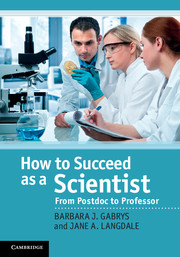Book contents
- Frontmatter
- Contents
- Preface
- Acknowledgements
- Part I Becoming an independent researcher
- 1 Managing your time
- 2 Giving a good research talk
- 3 Writing a quality research paper
- 4 Handling scientific criticism
- 5 Writing grant applications
- 6 Tools for managing research projects
- 7 Is there life beyond academia?
- 8 Applying for a job in academia
- 9 Applying for an independent research fellowship
- Part II Thriving in your new job
- Part III Managing your career
- Index
- References
4 - Handling scientific criticism
from Part I - Becoming an independent researcher
Published online by Cambridge University Press: 05 November 2011
- Frontmatter
- Contents
- Preface
- Acknowledgements
- Part I Becoming an independent researcher
- 1 Managing your time
- 2 Giving a good research talk
- 3 Writing a quality research paper
- 4 Handling scientific criticism
- 5 Writing grant applications
- 6 Tools for managing research projects
- 7 Is there life beyond academia?
- 8 Applying for a job in academia
- 9 Applying for an independent research fellowship
- Part II Thriving in your new job
- Part III Managing your career
- Index
- References
Summary
As scientists we are all exposed to criticism – it is one of the benefits of working in a discipline where rigour is seen as a community responsibility. However, no-one likes being criticised. Importantly, the more you receive criticism, the easier it becomes to deal with – so it is beneficial to actively seek criticism whenever possible. In this chapter we analyse samples of actual criticism and argue that criticism is delivered in four ways, three of which can be beneficial to you even if they sound damning. The four are objective/constructive and objective/non-constructive; subjective/constructive and subjective/non-constructive.
The theory
Doing science, reporting discoveries and communicating the importance of our activities exposes us to criticism from various sources. It can be peer review of a paper submitted to a prestigious journal; a referee’s report on a grant application; aggressive questioning from a member of the public during an outreach lecture; or a scathing article in the popular press. To be successful as a scientist, you need to handle criticism with confidence and grace, yet nobody likes to be criticised, least of all publicly. Some psychological studies argue that, when we are criticised, our response is of the ‘fight or flight’ type. It is accompanied by physical feelings of discomfort, anger or aggression, in any ratio depending on our personality, and often our response is not a measured one. If you have ever witnessed two rival scientists hotly arguing after a conference presentation, you know what we are talking about. Some understanding of the nature of a scientist – a subject explored by both sociology and psychology (Mahoney, 1979) – may help put this scenario in perspective. Apparently, we have a very idealistic view of what a scientist should be: objective, rational, open-minded, having superior intelligence, integrity and communality (sharing results with others). This view sets our expectations of behaviour, and if the reality turns out to be different, we are likely to be disappointed. The nature of the scientist delivering the criticism – a human factor – will thus influence both your perception of the criticism and your way of dealing with it.
The practice
Dealing with criticism is a skill that can be developed and as with any lasting skill must be practiced frequently. So seek it – start with people you trust, those who understand your work and your formal or informal mentor. Have you got data that you think would make a Nature paper? Put it together and ask somebody who has published there whether they think it is good enough. Accept the advice given; work on writing a paper or collecting more data and have another go, this time asking more people. Ideally, they should be outside your field if your ambition is to inform a broad readership. Having gone through this process, by the time you are ready to submit your paper, you will be reasonably certain of the quality of your work. You will also have practised arguments and counter-arguments and possibly improved your original idea as well. Being proactive in seeking criticism also helps you to detach yourself from feeling personally criticised: it is not that you are stupid, but that your data are not watertight.
- Type
- Chapter
- Information
- How to Succeed as a ScientistFrom Postdoc to Professor, pp. 39 - 44Publisher: Cambridge University PressPrint publication year: 2011



